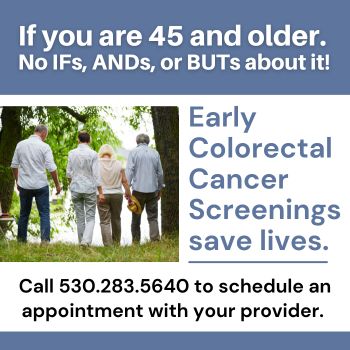November-08-2024

Colorectal cancer may be a leading cause of cancer-related deaths, but the good news is that it is also one of the most preventable cancers. Regular screening plays a critical role in catching the disease early, when it is most treatable. If you’re 45 or older, or if you have a family history of colorectal cancer or other risk factors, schedule your screening today. Early detection could save your life. Call 530-283-5640 to schedule today.
Colorectal cancer often develops without obvious symptoms, especially in the early stages. That’s why regular screening is so important — it helps detect cancers before they grow large enough to cause problems. By identifying and removing precancerous growths (polyps) early, screening can actually prevent colorectal cancer from developing in the first place. In fact, several test options are available to help detect colorectal cancer at an early, treatable stage.
According to the American Cancer Society, colorectal cancer screening helps identify cancers early, when they are easier to treat. Research has shown that regular screening can reduce the risk of dying from colorectal cancer by up to 68%.
The American Cancer Society recommends that adults at average risk of colorectal cancer begin screening at age 45 and continue through the age of 75. If you're at higher risk due to factors like a family history of colorectal cancer or certain genetic conditions, your doctor may recommend starting earlier or undergoing more frequent screenings.
There are two methods for screening:
Cologuard
Cologuard is a stool-based test that screens adults aged 45 and older at average risk for colorectal cancer. The test works by detecting specific DNA markers and blood in the stool that may indicate the presence of cancer. Cologuard is non-invasive and convenient, and it has been shown to detect 92% of colorectal cancers overall.
Colonoscopy
A colonoscopy is a more comprehensive test that allows a physician to visually examine the entire colon and rectum for abnormalities, such as polyps or tumors. If necessary, the doctor can remove polyps or take tissue samples during the procedure. Colonoscopy is both a screening and preventive measure, as it allows doctors to detect cancer early and prevent it by removing precancerous growths.
Which Test Is Right for You?
Both Cologuard and colonoscopy have their benefits. Your doctor will help guide you toward the most appropriate screening option based on your age, medical history, and risk factors, so it’s important to discuss your preferences and any concerns with your healthcare provider.
• In 2024, an estimated 106,590 new cases of colon cancer will be diagnosed.
• Additionally, 46,222 new cases of rectal cancer are expected.
• Women have a lifetime risk of 1 in 25 of developing colorectal cancer.
• Colorectal cancer remains the second leading cause of cancer-related deaths for both men and women.
• With these statistics in mind, it's clear that regular screening can be a lifesaving measure.
Consult with your physician to discuss the best screening options for you. Don't wait — get screened and take charge of your health.


Stay connected with your healthcare team and access your personal medical information anytime online with HealtheLife.
Patient Portal Information